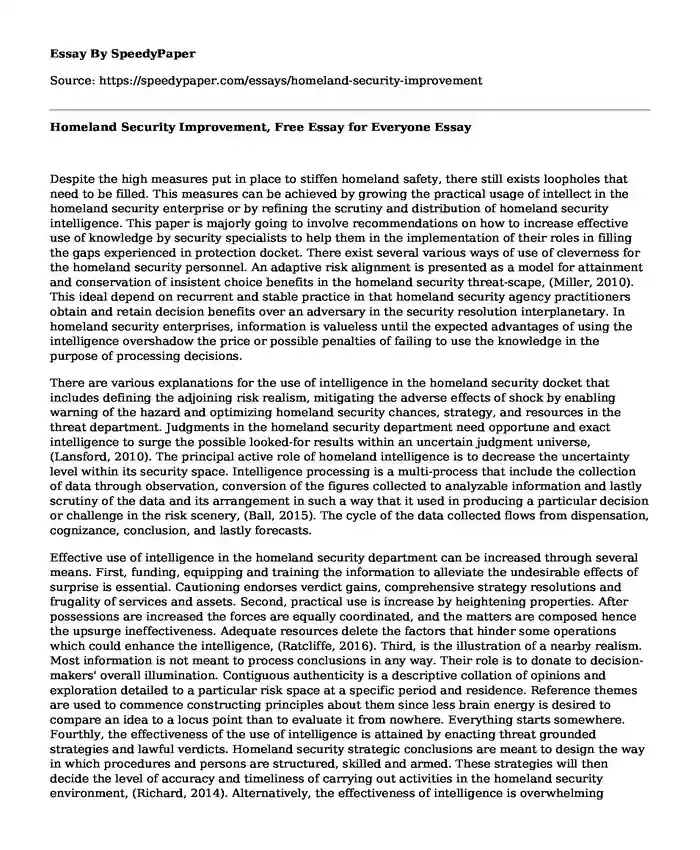
| Type of paper: | Essay |
| Categories: | Intelligence services Terrorism Homeland security |
| Pages: | 3 |
| Wordcount: | 713 words |
Despite the high measures put in place to stiffen homeland safety, there still exists loopholes that need to be filled. This measures can be achieved by growing the practical usage of intellect in the homeland security enterprise or by refining the scrutiny and distribution of homeland security intelligence. This paper is majorly going to involve recommendations on how to increase effective use of knowledge by security specialists to help them in the implementation of their roles in filling the gaps experienced in protection docket. There exist several various ways of use of cleverness for the homeland security personnel. An adaptive risk alignment is presented as a model for attainment and conservation of insistent choice benefits in the homeland security threat-scape, (Miller, 2010). This ideal depend on recurrent and stable practice in that homeland security agency practitioners obtain and retain decision benefits over an adversary in the security resolution interplanetary. In homeland security enterprises, information is valueless until the expected advantages of using the intelligence overshadow the price or possible penalties of failing to use the knowledge in the purpose of processing decisions.
There are various explanations for the use of intelligence in the homeland security docket that includes defining the adjoining risk realism, mitigating the adverse effects of shock by enabling warning of the hazard and optimizing homeland security chances, strategy, and resources in the threat department. Judgments in the homeland security department need opportune and exact intelligence to surge the possible looked-for results within an uncertain judgment universe, (Lansford, 2010). The principal active role of homeland intelligence is to decrease the uncertainty level within its security space. Intelligence processing is a multi-process that include the collection of data through observation, conversion of the figures collected to analyzable information and lastly scrutiny of the data and its arrangement in such a way that it used in producing a particular decision or challenge in the risk scenery, (Ball, 2015). The cycle of the data collected flows from dispensation, cognizance, conclusion, and lastly forecasts.
Effective use of intelligence in the homeland security department can be increased through several means. First, funding, equipping and training the information to alleviate the undesirable effects of surprise is essential. Cautioning endorses verdict gains, comprehensive strategy resolutions and frugality of services and assets. Second, practical use is increase by heightening properties. After possessions are increased the forces are equally coordinated, and the matters are composed hence the upsurge ineffectiveness. Adequate resources delete the factors that hinder some operations which could enhance the intelligence, (Ratcliffe, 2016). Third, is the illustration of a nearby realism. Most information is not meant to process conclusions in any way. Their role is to donate to decision-makers' overall illumination. Contiguous authenticity is a descriptive collation of opinions and exploration detailed to a particular risk space at a specific period and residence. Reference themes are used to commence constructing principles about them since less brain energy is desired to compare an idea to a locus point than to evaluate it from nowhere. Everything starts somewhere. Fourthly, the effectiveness of the use of intelligence is attained by enacting threat grounded strategies and lawful verdicts. Homeland security strategic conclusions are meant to design the way in which procedures and persons are structured, skilled and armed. These strategies will then decide the level of accuracy and timeliness of carrying out activities in the homeland security environment, (Richard, 2014). Alternatively, the effectiveness of intelligence is overwhelming unfavorable mental and judgment prejudices. The humanoid brain is made in such a way that it poorly manages improbability and thus tries to pursue evidence that approves an already-held decision and rubbishes information that contradicts a predominant view. Biases effects or prearranges the approach to be followed and expected results, (Ortmeier, 2013).
References
Ball G. Mark, Blerim Qela and Slawomir Wesolkowski. (2015). A Review of the Use of Computational Intelligence in the Design of Military Surveillance Networks. Vol 621
Lansford Tom, Jack Covarrubias, and Justin Miller. (2010). Fostering Community Resilience; Homeland security and Hurricane Katrina, London: Routledge.
Miller D. Andrew. (Sep 2010). Homeland Security Intelligence: To What End. Naval Postgraduate School. Monterey. California.
Ortmeier P. J. (2013). Online Test Bank for Introduction to Security Operations and Management. 4th ed. New Jersey: Pearson.
Ratcliffe H. Jerry. (2016). Intelligence-led Policing.2nd ed. London. Routledge.
Richard Sylves. (2014). Disaster Policy &Politics: Emergency Management and Homeland Security. London: CQ Press.
Cite this page
Homeland Security Improvement, Free Essay for Everyone. (2022, Feb 14). Retrieved from https://speedypaper.net/essays/homeland-security-improvement
Request Removal
If you are the original author of this essay and no longer wish to have it published on the SpeedyPaper website, please click below to request its removal:
- Marxism Today Essay Example for Everyone's Use
- Essay on Financial Statements in the Manufacturing Sector vs. in the Services Sector
- Essay Sample Focusing on Excessive Smartphone Use, Sleep Deprivation and Mental Health
- Source Analysis Paper Sample: Fixing Inequality in Hong Kong
- Free Essay Example: The 1970s in America's History
- Essay Sample on What is Blockchain
- Essay Sample on Cognitive Development Experiment
Popular categories




